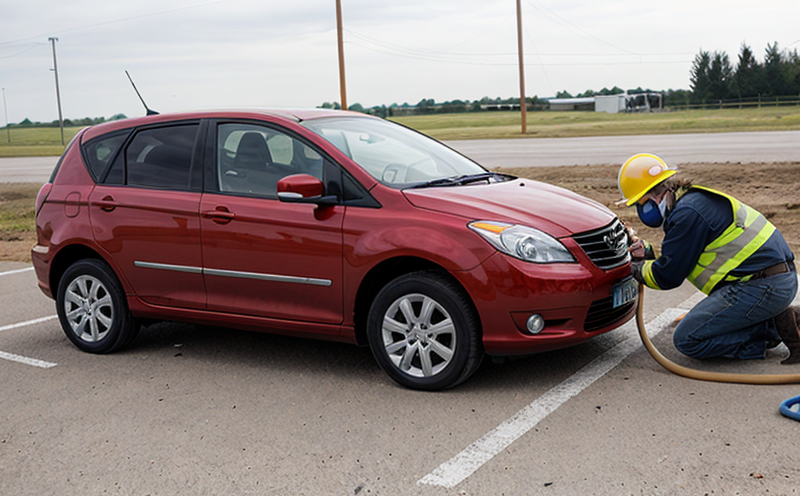UL 60730 Functional Safety Testing for Automatic Electrical Controls
The UL 60730 family of standards is a cornerstone in ensuring the safety and reliability of automatic electrical controls. This standard covers various aspects including but not limited to, energy storage systems, power supplies, and controllers used in consumer electronics, industrial equipment, and medical devices. The primary focus of this service is to perform functional safety testing for these components, ensuring they meet stringent safety requirements.
Functional safety testing under UL 60730 is critical as it helps identify potential hazards that could cause personal injury or damage to property. It ensures the device can operate safely in its intended environment and is robust enough to withstand various fault conditions without compromising user safety. This service is particularly relevant for sectors like automotive, medical devices, consumer electronics, and industrial machinery.
Before diving into the specifics of testing, it's important to understand that UL 60730 functional safety testing involves multiple steps from initial risk assessment to final certification. The process begins with a comprehensive hazard analysis followed by the design and implementation of appropriate mitigation measures. This is where our expertise lies—ensuring every step in this process adheres strictly to industry standards.
Our team utilizes state-of-the-art equipment and methodologies that are compliant with all relevant international standards such as ISO, IEC, and UL itself. We employ rigorous testing protocols that simulate real-world scenarios under which the controlled device might operate. This includes voltage stress tests, overcurrent protection checks, thermal cycling assessments, among others.
The outcome of this thorough testing is not just a certificate but also detailed reports that provide insights into any deficiencies found during testing. These findings are invaluable for continuous improvement and maintaining compliance with regulatory requirements. By partnering with us, you gain access to cutting-edge facilities and experienced professionals who bring years of combined expertise in electrical safety.
Understanding the scope of UL 60730 functional safety testing requires familiarity with its various parts and appendices. Part 1 addresses general requirements for the safety of household appliances, while part 2 focuses specifically on functional safety. Each part contains detailed guidelines that must be adhered to when designing, manufacturing, or modifying products.
| Part | Description |
|---|---|
| 1A | Hazard analysis and risk assessment (HARA) |
| 1B | Design and development of safety functions |
| 2A | Functional safety requirements for electrical equipment |
| 2B | Testing, monitoring, and validation of functional safety |
Our laboratory adheres strictly to these parts when performing tests. For instance, part 1A requires us to conduct a thorough hazard analysis to identify all potential risks associated with the product. Based on this information, we then proceed to design safety functions that can mitigate those risks effectively.
In summary, UL 60730 functional safety testing is more than just compliance—it represents a commitment to excellence in electrical control systems. By leveraging our expertise and state-of-the-art facilities, we ensure every test conducted meets the highest standards of safety and reliability.
Applied Standards
The UL 60730 family of standards encompasses several parts that address different aspects of functional safety in electrical equipment. Here’s an overview:
| Standard Number | Description |
|---|---|
| UL 60730-1 | General Requirements for the Safety of Household Appliances and Similar End-Use Products |
| UL 60730-2-2 | Functional Safety of Electrical Equipment for Use in Industrial Automation Systems |
| UL 60730-2-8 | Functional Safety of Medical Electrical Equipment and Associated Equipment |
| UL 60730-2-10 | Functional Safety of Consumer Control Devices and Appliances Containing Control Devices |
Each part provides specific guidelines that must be followed during the design, production, and modification stages. Particular emphasis is placed on ensuring that all safety functions are properly implemented and tested to prevent malfunctions that could lead to hazards.
The applicability of these standards extends across multiple industries including consumer electronics, industrial automation, medical devices, and automotive systems. Compliance with UL 60730 not only enhances product quality but also builds trust among consumers who rely on safe and reliable products daily.
Scope and Methodology
The scope of our functional safety testing services under UL 60730 is broad, encompassing all aspects necessary to ensure the safety and reliability of electrical control systems. Our methodology follows a structured approach that includes several key phases:
- Risk Assessment: Conducting an initial risk assessment helps us identify potential hazards associated with the product.
- Safety Analysis: Based on the identified risks, we perform detailed safety analyses to determine appropriate mitigation measures.
- Design and Implementation: We design and implement safety functions that are capable of mitigating these risks effectively.
- Testing: Rigorous testing is conducted using state-of-the-art equipment to simulate real-world conditions under which the product will operate.
- Monitoring and Validation: Continuous monitoring ensures ongoing compliance with functional safety requirements.
The scope of our services includes not only the actual testing but also providing detailed reports that outline any deficiencies found during testing. These reports serve as valuable tools for improving products continuously while maintaining strict adherence to regulatory standards.
| Phase | Description |
|---|---|
| Risk Assessment | Identifying all potential hazards associated with the product. |
| Safety Analysis | Determining appropriate mitigation measures based on identified risks. |
| Design and Implementation | Implementing safety functions that can mitigate these risks effectively. |
| Testing | Rigorous testing using advanced equipment to simulate real-world conditions. |
| Monitoring and Validation | Continuous monitoring ensures ongoing compliance with functional safety requirements. |
This structured approach ensures that every aspect of the product is thoroughly examined, leading to safer products that meet stringent quality standards. Our commitment to excellence extends beyond mere compliance; it encompasses a dedication to continuous improvement and reliability.





